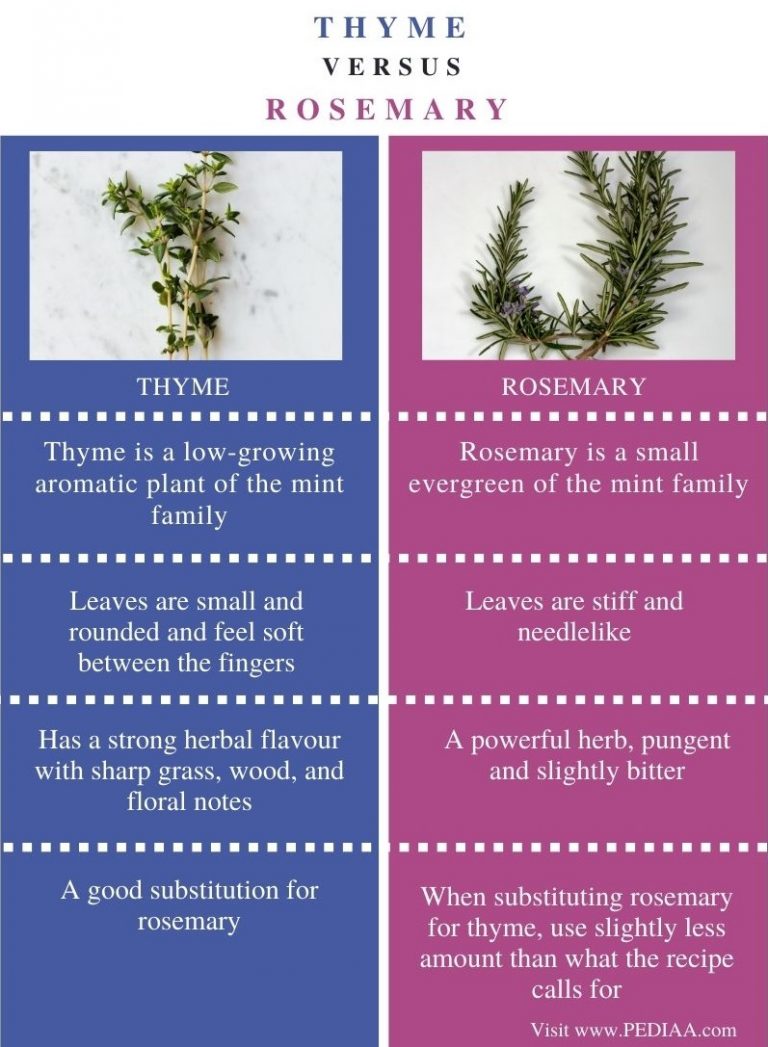Rosemary & Thyme: A Comparison Of Their Flavors And Uses

Table of Contents
Understanding the Flavor Profiles of Rosemary and Thyme
Both rosemary and thyme belong to the mint family (Lamiaceae), lending them a certain familial connection, yet their individual personalities shine through in their taste.
Rosemary's Distinctive Flavor
Rosemary boasts a strong, pungent, and intensely aromatic flavor. Its profile is often described as slightly piney, resinous, and even camphoraceous – a slightly medicinal, minty note. This robust flavor makes it a powerful culinary tool, but it's essential to use it judiciously.
- Pairs well with: Lamb, roasted vegetables (especially potatoes and root vegetables), hearty stews, and grilled meats. Its assertive nature stands up beautifully to rich, savory dishes.
- Strong, assertive flavor: Use rosemary sparingly, as its potent aroma can easily overpower other ingredients if used excessively. A little goes a long way!
- Complements citrus fruits well: The slightly bitter notes in rosemary are beautifully balanced by the brightness of lemon, orange, or grapefruit.
- Can be overpowering: Start with a small amount and add more to taste, avoiding overpowering the other flavors in your dish.
Thyme's Subtle yet Complex Flavor
In contrast to rosemary's boldness, thyme offers a more subtle yet equally complex flavor profile. Its taste is earthy, slightly lemony, and possesses a warm, comforting aroma. This versatility makes thyme a welcome addition to a wide array of culinary creations.
- Pairs well with: Poultry, soups, stews, tomato-based dishes, and mushrooms. Its delicate nature complements a variety of ingredients without dominating the palate.
- More delicate flavor: Unlike rosemary, thyme's flavor is more gentle, allowing for more liberal use in recipes.
- Offers a warm, comforting aroma: Thyme's fragrance adds an inviting dimension to your dishes, creating a sense of warmth and coziness.
- Works well in both savory and sweet applications: While frequently used in savory dishes, thyme also complements sweet recipes, adding a unique herbal note to baked goods and desserts.
Culinary Applications: Rosemary vs. Thyme
The distinct flavor profiles of rosemary and thyme naturally lead to different culinary applications. Both herbs offer incredible versatility, but understanding their nuances enhances your cooking.
Rosemary in the Kitchen
Rosemary's robust flavor shines in dishes that can handle its assertive presence.
- Rosemary sprigs for roasting meats: Large sprigs of fresh rosemary are ideal for roasting lamb, chicken, or pork. The herb adds immense flavor to the meat while also creating an appealing aroma during cooking.
- Chopped rosemary in sauces and marinades: Finely chopped rosemary adds depth and complexity to sauces and marinades for grilled meats, vegetables, and fish.
- Rosemary-infused oils and vinegars: Rosemary's potent flavor infuses beautifully into oils and vinegars, creating flavorful additions to salads, dips, and marinades.
- Rosemary bread and other baked goods: Rosemary's unique flavor complements bread, focaccia, and other baked goods, adding a distinctive savory note.
Thyme in the Kitchen
Thyme’s milder flavor makes it a versatile ingredient in numerous dishes.
- Thyme in casseroles and stews: Thyme's subtle yet earthy notes add warmth and depth to casseroles, stews, and soups.
- Thyme in stocks and broths: Adding thyme sprigs to stocks and broths infuses a subtle herbal flavor, enhancing the overall taste.
- Thyme as a finishing herb: Thyme sprigs can be used as a finishing herb for roasted meats and vegetables, adding a pop of fresh flavor and color.
- Thyme in herb butters and compound butters: Thyme’s delicate flavor pairs wonderfully with butter, creating flavorful additions to bread, grilled meats, and vegetables.
Health Benefits: A Brief Comparison
Beyond their culinary applications, both rosemary and thyme offer potential health benefits.
Rosemary's Health Properties
Rosemary is rich in antioxidants and has been linked to potential cognitive benefits, including improved memory and focus. Further research is needed to confirm these effects fully.
Thyme's Health Properties
Thyme possesses antimicrobial properties and has been traditionally used to support immune function. Similar to rosemary, more research is needed to solidify these potential benefits. Always consult a healthcare professional before using herbs for medicinal purposes.
Conclusion
Rosemary and thyme, while both belonging to the same family, offer distinctly different flavor profiles and culinary applications. Rosemary’s strong, pungent flavor is best suited for robust dishes, while thyme's delicate, earthy notes enhance a wider range of recipes. Understanding these differences allows you to unlock the full potential of both herbs, creating dishes with vibrant, complex flavors. Experiment with adding fresh rosemary to your next roasted chicken or using thyme to elevate your tomato soup. Unlock the full potential of your culinary creations with the right balance of rosemary and thyme!

Featured Posts
-
 Dragon Den Winners Lawsuit Alleged Puppy Toilet Idea Theft
May 31, 2025
Dragon Den Winners Lawsuit Alleged Puppy Toilet Idea Theft
May 31, 2025 -
 Elon Musk Resigns From Trump Administration Reasons And Implications
May 31, 2025
Elon Musk Resigns From Trump Administration Reasons And Implications
May 31, 2025 -
 One Night Only Brandon Inge Returns To The Dugout In Kalamazoo
May 31, 2025
One Night Only Brandon Inge Returns To The Dugout In Kalamazoo
May 31, 2025 -
 Major Archaeological Discovery 3 000 Year Old Mayan Complex Unveiled
May 31, 2025
Major Archaeological Discovery 3 000 Year Old Mayan Complex Unveiled
May 31, 2025 -
 Nyt Mini Crossword Answers For Thursday April 10th
May 31, 2025
Nyt Mini Crossword Answers For Thursday April 10th
May 31, 2025
